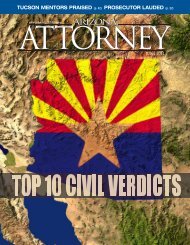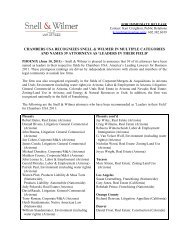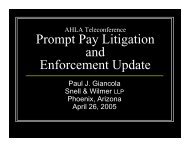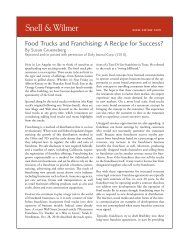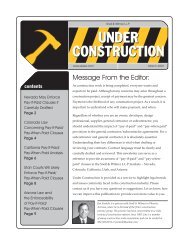Government Receivables as Collateral? - Snell & Wilmer
Government Receivables as Collateral? - Snell & Wilmer
Government Receivables as Collateral? - Snell & Wilmer
You also want an ePaper? Increase the reach of your titles
YUMPU automatically turns print PDFs into web optimized ePapers that Google loves.
OVER A CENTURY: BUILDING BETTER BANKS - HELPING COLORADANS REALIZE DREAMS<br />
May/June 2009<br />
Improve Your Information Security<br />
Quickly, E<strong>as</strong>ily<br />
and CHEAPLY<br />
OFFICIAL JOURNAL OF THE COLORADO BANKERS ASSOCIATION
OVER A CENTURY: BUILDING BETTER BANKS - HELPING COLORADANS REALIZE DREAMS<br />
FEATURE<br />
ARTICLE<br />
FEATURE<br />
ARTICLE<br />
BRIAN D. CUNNINGHAM<br />
NICOLE W. SKORUPKA<br />
<strong>Snell</strong> & <strong>Wilmer</strong> LLP<br />
<strong>Government</strong> <strong>Receivables</strong> <strong>as</strong> <strong>Collateral</strong><br />
Proceed With<br />
Caution!<br />
Current economic troubles have caused<br />
bankers to closely examine the quality<br />
of their borrowers’ accounts receivable<br />
that secure <strong>as</strong>set b<strong>as</strong>ed loans. As account<br />
18<br />
As part of the overall<br />
review of a borrower’s<br />
accounts, if the borrower<br />
h<strong>as</strong> receivables<br />
from the United States<br />
<strong>Government</strong>, it is<br />
imperative that the<br />
banker ensure that the<br />
loan and loan documents<br />
comply with the<br />
Federal Assignment of<br />
Claims Act.<br />
debtors delay paying invoices and the overall<br />
financial strength of account debtors weakens,<br />
borrowing b<strong>as</strong>e availability under a bank’s<br />
typical commercial loan documents declines<br />
and the overall value of the bank’s collateral<br />
diminishes. Bankers are routinely finding<br />
that foreclosing upon accounts in the current<br />
environment provides the bank with far less of<br />
a return than w<strong>as</strong> originally contemplated.<br />
As part of the overall review of a borrower’s<br />
accounts, if the borrower h<strong>as</strong> receivables from<br />
the United States <strong>Government</strong>, it is imperative<br />
that the banker ensure that the loan and loan<br />
documents comply with the Federal Assignment<br />
of Claims Act (“Act”). The Federal Assignment<br />
of Claims Act is often misunderstood. The Act,<br />
found at 41 U.S.C. § 15, applies to all obligations<br />
owing by the federal government or any agency<br />
or department of the federal government. It is<br />
supplemented by the Federal Acquisition Regulations<br />
(“FAR”) found in Title 48 of the Code<br />
of Federal Regulations. The Act only governs<br />
notices of <strong>as</strong>signment and payment instructions.<br />
If the Bank does not comply with the Act, it may<br />
still have a valid <strong>as</strong>signment or security interest<br />
and prevail against junior security interests,<br />
judgment creditors and bankruptcy trustees.<br />
However, if a bank does not comply with the<br />
Act and the government agency pays someone<br />
other than the bank, the bank h<strong>as</strong> no claim<br />
against the government agency.<br />
The Framework<br />
Prior to 1940, federal law prohibited the <strong>as</strong>signment<br />
of accounts receivable from contracts<br />
with the federal government, which greatly<br />
diminished the value of such receivables <strong>as</strong> loan<br />
collateral. Although these anti-<strong>as</strong>signment laws<br />
were implemented to protect the government<br />
from the administrative burden of investigating<br />
the validity of each <strong>as</strong>signment and any corresponding<br />
claim, the laws effectively reduced<br />
the ability of private contractors that supply<br />
goods or services to the federal government to<br />
secure financing by granting lenders an interest<br />
in their accounts receivable. The Act, p<strong>as</strong>sed in<br />
1940, addressed the impact of the anti-<strong>as</strong>signment<br />
laws by exempting certain <strong>as</strong>signments<br />
to “financing institutions.” When financing<br />
government contractors, banks must proceed<br />
with care when navigating the extensive statutory<br />
and regulatory framework applicable to<br />
<strong>as</strong>signments of proceeds from contracts with<br />
the federal government.<br />
The Act encourages lenders to finance<br />
government contractors by permitting the<br />
contractors to <strong>as</strong>sign the right to payment<br />
from receivables <strong>as</strong> loan collateral. Despite the<br />
name of the Act (The Assignment of Claims<br />
Act), permissible <strong>as</strong>signments only capture<br />
the right to receive payments due under the<br />
contract rather than the contract itself or<br />
claims other than for payment arising under<br />
the contract. In short, if the bank complies<br />
with the Act, the government will pay contract<br />
payments directly to the bank.<br />
Conditions and procedures for <strong>as</strong>signments<br />
under the Act are prescribed in FAR<br />
and are supplemented through regulations<br />
promulgated by federal agencies contracting
OVER A CENTURY: BUILDING BETTER BANKS - HELPING COLORADANS REALIZE DREAMS<br />
With careful consideration of the risks and rewards, and diligent<br />
observation of the legal framework, lending against government<br />
receivables may provide lenders with a substantial source of business.<br />
under the Act. Under those rules, an <strong>as</strong>signment of money due<br />
or to become due under a government contract <strong>as</strong> security for<br />
a loan is valid if:<br />
The contract specifies payment of at le<strong>as</strong>t $1,000;<br />
The contract does not prohibit an <strong>as</strong>signment;<br />
The <strong>as</strong>signment is made to a bank, trust company or other<br />
financing institution (i.e., institution that deals in money<br />
<strong>as</strong> the primary function of its business activity);<br />
Unless otherwise expressly permitted in the contract, the<br />
<strong>as</strong>signment:<br />
• Covers all unpaid amounts payable under the contract;<br />
• Is not subject to further <strong>as</strong>signment;<br />
• Is made to one party, and such party participates<br />
directly in the financing, except that any <strong>as</strong>signment<br />
may be made to one party <strong>as</strong> agent or trustee for two<br />
or more parties participating in the financing of the<br />
contract; and<br />
Lender sends an original plus three copies of the notice of<br />
<strong>as</strong>signment and a true copy of the <strong>as</strong>signment instrument<br />
to (a) the administrative contracting officer performing all<br />
contract administrative functions, (b) any surety on bonds<br />
applicable to the contract, and (c) the disbursing officer<br />
authorized under the contract to make payments.<br />
The administrative contracting officer is given a re<strong>as</strong>onable<br />
time after receipt of the notice of <strong>as</strong>signment to determinate<br />
if the <strong>as</strong>signment is valid.<br />
In addition to the foregoing, FAR requires that a lender be<br />
registered in the Central Contractor Registration datab<strong>as</strong>e<br />
(“CCR”). CCR is used to collect, store and disseminate a variety<br />
of information for the Federal government and, for purposes<br />
of an <strong>as</strong>signment of money due under a government contract,<br />
facilitate paperless payment through electronic funds transfer.<br />
Proceed With Caution ⎥ continued on page 20<br />
19<br />
May • June 2009
OVER A CENTURY: BUILDING BETTER BANKS - HELPING COLORADANS REALIZE DREAMS<br />
PROCEED WITH CAUTION – continued<br />
There may be additional requirements applicable to <strong>as</strong>signments<br />
of amounts owing by certain federal departments or<br />
agencies. The provisions of the Code of Federal Regulations<br />
for the applicable department or agency should be reviewed<br />
in each instance.<br />
The Risks and Rewards<br />
Even after full compliance with the Act and FAR, lenders’<br />
collateral may be exposed to certain claims from sureties<br />
or the contractors’ employees. Pursuant to the Miller Act,<br />
contractors must furnish certain payment and performance<br />
bonds for federal government contracts pertaining to the<br />
construction, alteration or repair of a public building or<br />
public work. A lender taking an <strong>as</strong>signment of proceeds<br />
from such contract is imputed with knowledge of the Miller<br />
Act’s bond requirements. Any surety required to perform<br />
under a bond will have superior rights to proceeds from the<br />
underlying contract, regardless of an earlier <strong>as</strong>signment.<br />
Additionally, a lender’s rights to <strong>as</strong>signed payments may<br />
be suspended if a contractor fails to comply with certain<br />
federal laws protecting employees, such <strong>as</strong> federal wage<br />
and hour statutes.<br />
It should be noted that some courts have held that the<br />
Act requires that the bank must show that it loaned money<br />
or at le<strong>as</strong>t made money available for the performance of the<br />
government contract.<br />
Regardless of the foregoing, financing government contractors<br />
may still be attractive to banks because of the continuous stream<br />
of timely payments available to pay down any outstanding balances.<br />
The federal government is subject to the Prompt Payment Act,<br />
which incentivizes the government to make payments when due<br />
by applying interest to late payments at a rate set by the Secretary<br />
of the Tre<strong>as</strong>ury. Additionally, with the federal government <strong>as</strong> the<br />
account debtor, lenders do not <strong>as</strong>sume risk of non-payment due<br />
to insolvency <strong>as</strong> with non-government account debtors. Unless<br />
payments were made <strong>as</strong> a result of fraud, the federal government<br />
may not recover proceeds once paid to lenders.<br />
How to Proceed<br />
Register with CCR. To avoid additional delay, a lender<br />
should register in CCR (see www.ccr.gov) prior to sending its<br />
notice of <strong>as</strong>signment and a copy of the <strong>as</strong>signment instrument<br />
to the administrative contracting officer. After registering, the<br />
lender must update or renew its CCR registration once per year<br />
to maintain active status.<br />
Thoroughly review government contracts. <strong>Government</strong><br />
contracts must meet the conditions prescribed by the Act<br />
20<br />
Jones & Keller, a full service business law firm, advises<br />
clients on all <strong>as</strong>pects of banking law, including regulatory<br />
ROBIN R. KOVASH<br />
ERNEST J. PANASCI<br />
DEBORAH L. BAYLES<br />
MARK J. KOLBER<br />
BENNETT M. SIGMOND<br />
R. STEVEN JONES<br />
KRISTIN S. OTERO<br />
matters, secured lending, agricultural lending, initial<br />
charters, mergers and acquisitions, employment law,<br />
intellectual property law, real estate, foreclosures, workouts,<br />
bankruptcy, debt financing, public and private<br />
equity financing and strategic planning.<br />
STACIA B. DELANEY<br />
KERRI P. ASSELL<br />
RYAN M. BEHRMAN<br />
www.joneskeller.com<br />
Serving the legal needs of the West since 1936<br />
4600 South Ulster Street, Suite 880 | Denver, CO 80237<br />
303.376.8400 | 303.376.8439 fax<br />
1625 Broadway, Ste. 1600 | Denver, CO 80202<br />
303.573.1600 | 303.573.8133 fax
OVER A CENTURY: BUILDING BETTER BANKS - HELPING COLORADANS REALIZE DREAMS<br />
and FAR. Check to ensure that <strong>as</strong>signment is not prohibited<br />
by the contract. Additionally, the contracts should contain a<br />
“no-setoff” commitment to prevent the federal government<br />
from reducing <strong>as</strong>signed receivables to setoff the contractor’s<br />
indebtedness to the government.<br />
Take care drafting <strong>as</strong>signment instruments. Assignment<br />
instruments must grant the lender ownership in the proceeds;<br />
a collateral <strong>as</strong>signment granting a security interest will be<br />
insufficient. Additionally, the <strong>as</strong>signment should only cover<br />
“moneys due or to become due” under the contract and should<br />
identify the contract by number. Blanket <strong>as</strong>signments capturing<br />
all <strong>as</strong>signable rights under the contract are not permitted<br />
under the Act and may be rejected by the administrative<br />
contracting officer.<br />
Confirm appropriate form and delivery instructions for<br />
notices of <strong>as</strong>signment. Lenders must strictly comply with the<br />
notice requirements prescribed by FAR, including the form of<br />
the notice. Courts have consistently invalidated <strong>as</strong>signments<br />
for non-compliance with the notice requirements.<br />
Perfect security interest in accounts receivable. Security<br />
interests must be perfected in accordance with the Uniform<br />
Commercial Code <strong>as</strong> is done when financing a non-government<br />
contractor. The Act does not apply to disputes between private<br />
parties (i.e., lenders and their borrowers) so compliance with<br />
the Act does not perfect a security interest and vice-versa.<br />
Ensure compliance with applicable state laws. This article<br />
summarizes federal laws regarding <strong>as</strong>signments of claims. If<br />
the contract is with a state agency or department, lenders must<br />
review and comply with any applicable state <strong>as</strong>signments of<br />
claims’ laws.<br />
Although the foregoing article is not a comprehensive<br />
summary of the Act, lenders should be able to begin <strong>as</strong>sessing<br />
whether credit facilities secured in whole or in part by government<br />
receivables are fe<strong>as</strong>ible and can be administered in a<br />
cost efficient manner. With careful consideration of the risks<br />
and rewards, and diligent observation of the legal framework,<br />
lending against government receivables may provide lenders<br />
with a substantial source of business. <br />
Brian D. Cunningham is a partner with the Salt Lake City office of <strong>Snell</strong><br />
& <strong>Wilmer</strong> L.L.P. His practice is concentrated in banking law, secured<br />
lending, letters of credit and payment systems, general commercial<br />
and consumer finance, and creditors’ rights. Brian can be contacted<br />
at bcunningham@swlaw.com or 801-257-1954.<br />
Nicole W. Skorupka is an <strong>as</strong>sociate with the Denver office of <strong>Snell</strong><br />
& <strong>Wilmer</strong> L.L.P. Her practice is concentrated in real estate and commercial<br />
finance, including construction lending, <strong>as</strong>set b<strong>as</strong>ed lending,<br />
mezzanine lending, loan participations and syndications, workouts,<br />
and reorganizations. Nicole can be contacted at nskorupka@swlaw.<br />
com or 303-634-2128.<br />
LAW OFFICES OF<br />
21<br />
JONES & KELLER<br />
APROFESSIONAL CORPORATION<br />
is ple<strong>as</strong>ed to announce that<br />
Zsolt K. Besskó<br />
(formerly of Guaranty Bancorp, Buchanan Ingersoll & Rooney, PC<br />
and Sullivan & Cromwell LLP)<br />
h<strong>as</strong> joined the firm <strong>as</strong> a shareholder<br />
resident in the Denver Tech Center office<br />
Zsolt’s practice will emph<strong>as</strong>ize banking,<br />
corporate, securities/SEC, mergers & acquisitions,<br />
venture capital/private equity, corporate governance<br />
and executive compensation<br />
For more information on<br />
how to protect your bank contact<br />
Brian Tingey<br />
801.277.8210<br />
World Trade Center<br />
1625 Broadway<br />
16th Floor<br />
Denver, CO 80202<br />
(303) 573-1600 - phone<br />
(303) 573-8133 - fax<br />
Denver Tech Center<br />
5613 DTC Parkway<br />
Suite 970<br />
Greenwood Village, CO 80111<br />
(303) 376-8400 - phone<br />
(303) 376-8439 - fax<br />
contact Zsolt at:<br />
(303) 376-8422<br />
zbessko@joneskeller.com<br />
May • June 2009



